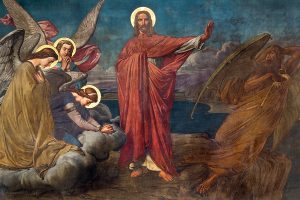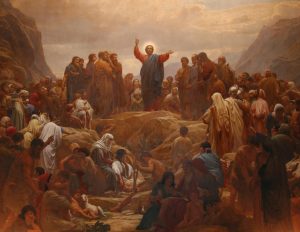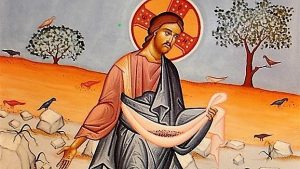Last Wednesday, we received the imposition of ashes on our forehead, a sign that we are consenting to go through the process of repentance and conversion as we believe and proclaim the gospel through words, actions and way of life as Catholics.
This first Sunday of Lent is not to think about sacrifices but about how the love for God and others is effectively working with us. This is a call to not be easily tempted by Satan, but to allow the grace of God to transform us.
The three readings today speak about our journey as we begin this season of Lent. We open our hearts to make some decisions that are not short-sighted, but a long term planning to make life healthier and successful in so many ways because we have chosen to be with God, as God continues to reach out to us for Him.
In our First Reading from the book of Genesis, we hear of an eternal garden created for the purpose of understanding the mighty deeds of God on creation. It is a place where everything is peaceful and perfectly created to make Adam and Eve live in abundance, in harmony, peace, and joy. However, they allowed themselves to be distracted by Satan.
St. Augustine teaches that this book of Genesis points us to the truth about God that He created everything, including the first man and woman, which is the sign of humanity’s dependence on God in relation to being created in His image and likeness. Thus, this concept of St. Augustine, regarding His power of creating Adam/Eve had been generated by our relationship with God. Despite the disruption because of their pride, we are reminded of God’s intention that there is the possibility of renewal, restoration and discovering the best way for change and new life. In his book “De Trinitate Book 12.10,” he is trying to look at the possibility of how we could restore the broken relationship and find our way back to God through our external and inner actions for the restoration of the true identity and creative image.
The second reading from the letter of St. Paul to the Romans speaks that, “by transgression of the one, death came to reign.” Through one man’s sin, death entered the world. St. Paul explains about the “New Adam, Jesus,” who is obedient and righteous accepting humbly living a life on the “Tree of the Cross.”
Hearing the gospel today, Jesus proves his own identity as He was “led by the Spirit into the dessert to be tempted by the devil.” Jesus’ action in this story confronting Satan proves His closeness with the Father and fidelity to His mission. There are spiritual points that we shall reflect on together for better understanding:
First, Jesus fasted for forty days; therefore, He was hungry and vulnerable. Satan said to Him,” If you are the Son of God, command these stones become loaves of bread.” Jesus replied, “Man does not live by bread alone, but by every word that comes forth from the mouth of God.” This is a very powerful statement to reflect on during this season. It is by fasting that we become weak and yet, our spiritual power is great. The Church encourages us to give way to our ancient tradition of fasting, a powerful spiritual discipline which brings about change and the clarity of mind, body and spirit. That is the reason why medical experts give advice to fast from time to time. Fasting allows us to reveal the clearer picture of both our health and true spiritual conditions.
Second, Jesus was standing at the parapet of the temple. Satan told Him, “If you are the Son of God, throw yourself down.” And “He will command his angels concerning you and with their hands they will support you, lest you dash your foot against a stone.” Jesus made this reply, “You shall not put the Lord, your God to the test.”
Oftentimes, when we are at the lowest point, desperate and frustrated that we can’t find God’s response to our prayers, we turn to other gods. Because of not finding personal gratification, our faith wavers. We want to manipulate God according to our human terms. This is a wrong and detrimental kind of spirituality. Our life is not about what we want, but how we fulfill His holy will, be pleasing and glorify His name. Sure enough, we should not ever tempt God because we personify Satan by how we act.
Third, Jesus was taken to the highest point of the mountain, then Satan said to Him, “All these I shall give you if you will prostrate yourself and worship me.” Jesus, cried out, “Get away Satan, the Lord, your God, shall you worship and him alone shall you serve.” Nowadays, many people are selling their souls to Satan because of greed, selfishness, and power. They appear happy and satisfied but interiorly there is that boiling anger and discontentment of everything. That is why when there in no peace within, we can’t sleep and live comfortably. We are always haunted by fear and anxiety, troubled by how we worship this false-god. That kingdom promised by Satan is empty, without acknowledging the real creator, our loving God, and I could imagine how difficult life would be.
Today, we are invited to make sound decisions for ourselves. Lent is the time to assess and rediscover our genuine identity. Let us bring the broken and “disjointed” relationship of our first parents by reconstructing with openness to the Spirit of God.
Let us accept Jesus, the New Adam, to be listened to and patiently carry our own cross, not choosing to have an easy and quick way of living our Christian life.
God bless you.
Fr. Arlon, osa
— — — — —
El Dictado del Corazón
Primer Domingo de Cuaresma, año A
- Génesis 2:7-9; 3:1-7
- Salmos 51:3-4, 5-6, 12-13, 17
- Romanos 5:12-19
- Mateo 4:1-11
El miércoles pasado recibimos la imposición de ceniza en nuestra frente, señal de que estamos consintiendo en pasar por el proceso de arrepentimiento, conversión mientras creemos y proclamamos el evangelio a través de palabras, acciones y forma de vida como católicos.
Este Primer Domingo de Cuaresma no es para pensar en sacrificios sino en que, si amamos a Dios y al prójimo estamos obrando efectivamente. Un llamado a no dejarse tentar fácilmente por Satanás sino dejar que la gracia de Dios nos transforme.
Las tres lecturas de hoy hablan de nuestra jornada al comenzar esta temporada de Cuaresma. Abrimos nuestro corazón para tomar algunas decisiones que no son miopes sino una planificación a largo plazo para hacer que la vida sea más saludable y exitosa de muchas maneras porque hemos elegido estar con Dios, ya que Dios continúa buscándonos para Él.
En nuestra Primera Lectura del libro de Génesis, escuchamos de un jardín eterno creado con el propósito de comprender las obras poderosas de Dios en la creación. Un lugar donde todo es pacífico y perfectamente creado para que Adán y Eva vivan en abundancia, en armonía, paz y alegría. Sin embargo, se dejaron envolver por Satanás.
San Agustín enseña que este libro del Génesis nos señala la verdad acerca de Dios que Él creó al primer hombre y mujer, lo cual es el signo de la dependencia de la humanidad en Dios en relación con ser creado a Su imagen y semejanza. Así, este concepto de San Agustín, respecto a Su poder de crear a Adán y a Eva, había sido generado por nuestra relación con Dios. A pesar de la interrupción debido a su orgullo, se nos recuerda la intención de Dios de que existe la posibilidad de renovación, restauración y descubrimiento de la mejor manera para el cambio y la nueva vida. En su libro “De Trinitate libro 12.10”, está tratando de buscar la posibilidad de cómo podemos restaurar la relación rota y encontrar nuestro camino de regreso a Dios a través de nuestras acciones internas y externas para la restauración de la verdadera identidad e imagen creativa.
La segunda lectura de la carta de San Pablo a los Romanos habla de “por la transgresión de uno, vino a reinar la muerte”. Por un hombre pecó y la muerte entró en el mundo. San Pablo explica que el “Nuevo Adán, Jesús”, quien es obediente y justo, acepta humildemente vivir una vida en el “Árbol de la Cruz”.
Al escuchar el evangelio hoy, Jesús prueba su propia identidad cuando fue “llevado por el Espíritu al desierto para ser tentado por el diablo”. La acción de Jesús en esta historia frente a Satanás demuestra su cercanía con el Padre y la fidelidad a su misión. Hay puntos espirituales que reflexionaremos juntos para una mejor comprensión:
Primero, Jesús ayunó durante cuarenta días, por lo tanto, estaba hambriento y vulnerable. Satanás le dijo: Si eres Hijo de Dios, manda que estas piedras se conviertan en panes. Jesús respondió: “Está escrito: No sólo de pan vive el hombre, sino también de toda palabra que sale de la boca de Dios”. Esta es una declaración muy poderosa para reflexionar durante esta temporada. Es ayunando que nos debilitamos y, sin embargo, nuestro poder espiritual es grande. La Iglesia nos anima a dejar paso a nuestra antigua tradición del ayuno, un poderoso discípulo espiritual que produce cambios y claridad de mente, cuerpo y espíritu. Esa es la razón por la cual los expertos médicos aconsejan ayunar de vez en cuando. El ayuno nos permite revelar una imagen más clara tanto de nuestra salud como de nuestras verdaderas condiciones espirituales.
Segundo, el diablo lo llevó a la ciudad santa, lo puso en la parte más alta del templo y le dijo: “Si eres el Hijo de Dios, échate para abajo, porque está escrito: Mandará a sus ángeles que te cuiden y ellos te tomarán en sus manos, para que no tropiece tu pie en piedra alguna”. Jesús le contestó: “También está escrito: No tentarás al Señor, tu Dios”.
A menudo, cuando estamos en el punto más bajo, desesperados y frustrados por no poder encontrar la respuesta de Dios a nuestras oraciones, recurrimos a otros dioses. ¡Por no encontrar gratificación personal, nuestra fe tejedora! Queremos manipular a Dios según nuestros términos humanos. Esta es una clase de espiritualidad equivocada y perjudicial. Nuestra vida no se trata de lo que queremos sino de cómo cumplimos la santa voluntad de Dios, seamos agradables y glorifiquemos su nombre. Efectivamente, nunca debemos tentar a Dios porque personificamos a Satanás por la forma en que actuamos.
Tercero, Jesús fue llevado al punto más alto de la montaña, entonces Satanás le dijo: “Todo esto te daré si te postras y me adoras”. Jesús, clamó: “Aléjate Satanás, el Señor, tu Dios, adorarás y solo a él servirás”. Hoy en día, muchas personas están vendiendo sus almas a Satanás debido a la codicia, el egoísmo y el poder. Parecen felices y satisfechos pero interiormente hay esa ira hirviente y descontento de todo. Es por eso que cuando no hay paz interior, no podemos dormir y vivir cómodamente. Siempre estamos obsesionados por el miedo y la ansiedad, preocupados por la forma en que adoramos a este dios falso. Ese reino prometido por Satanás está vacío, sin reconocer al verdadero creador, nuestro Dios amoroso, entonces podría imaginar lo difícil que puede ser la vida.
Hoy, estamos invitados a tomar decisiones acertadas por nosotros mismos. La Cuaresma es el tiempo para evaluar y redescubrir nuestra genuina identidad. Traigamos la relación rota y “desarticulada” de nuestros primeros padres reconstruyéndonos con apertura al Espíritu de Dios. Aceptemos a Jesús, el Nuevo Adán para ser escuchados y llevar con paciencia nuestra propia cruz, no optando por tener una forma fácil y rápida de vivir nuestra vida cristiana.
Dios los bendiga.
Padre Arlón, osa










